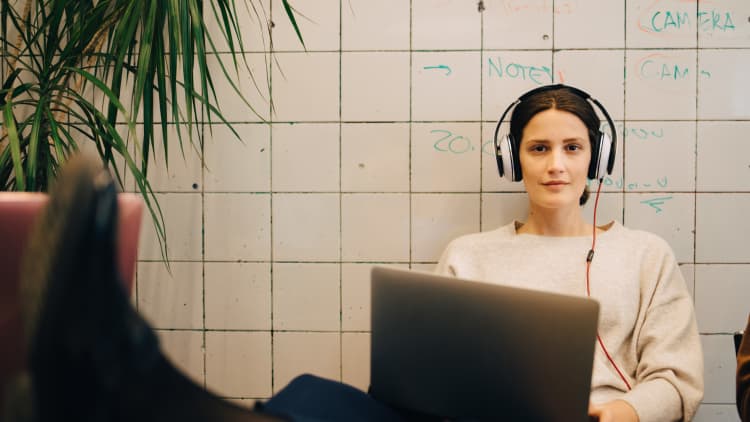Quitting is having a moment.
As the U.S. job market recovers from the pandemic, some workers are feeling more empowered to prioritize their own well-being above their employer. Workplace leaders began predicting a mass exodus in early 2021, with one survey finding that one in four workers plans to quit their job after the pandemic. And in what some are calling "the great resignation," 4 million people quit their jobs in April, sparked by confidence they can find higher pay, more accommodating hours and better working conditions elsewhere.
Other workers, feeling burned out living and working through a global health crisis, are finding that the shift in leverage is helping them put their mental health and well-being first.
Finding a better fit after unemployment crunch
After losing her retail job during the pandemic and being out of work for a year, Stephanie Becker was relieved to see an uptick in openings by spring 2021. She went on an interviewing spree in May and, by early June, started working at a dog boarding and day care facility in Phoenix.
While she was eager to care for the animals, Becker, 21, says the work environment was untenable. Instead of working the day shift as previously discussed, Becker says she was assigned to work mornings that began at 4:30 a.m. She didn't get along with one of her managers. And when a family member back home on the East Coast became sick with Covid-19 recently, she was denied a weekend off in July to go care for him.
Less than two weeks into the job, Becker says the mental stress was causing her to feel physically ill.
Every day after work, she tells CNBC Make It, "as soon as I got into the car, I wanted to break down and cry. I just didn't want to do it anymore ... Waking up at 3 a.m. to go do something I didn't want to do, with people I didn't want to deal with, didn't make me feel good."
After one particularly stressful shift, followed by a tearful evening at home, Becker says her boyfriend encouraged her to quit. He could cover the bills until she found new work, and she would use her side hustle selling artwork online to pay for groceries.

The next day, she met with the manager she got along with, delivered the news and handed in her equipment.
Becker's jobless period might not last long in today's job market. The day after she quit, she had two new job interviews lined up.
She says finding a new job with health and dental benefits, which her previous employer didn't offer, is priority No. 1. And she feels better about taking more time to find a good match. "I feel like I did rush in," she says of accepting her last job. "It was my first job in a year because of Covid, and I was excited and wanted to start working. But this time, I'll go a little slower."
She adds: "If I could tell myself anything while I was trying to quit, it's this: If [work] is affecting you so much, it's not worth working yourself so hard and not feeling good that you aren't able to enjoy yourself at home."
Trading the office for independence
Some employees have enjoyed the flexibility of working from home so much that, according to one survey, 39% of people said they would consider quitting if their employers weren't flexible about remote work moving forward.
That's what Detroit resident Sarah Fleming, 25, did last week. She spent the pandemic working remotely designing training materials for a mortgage company and embraced the new level of work-life balance. She no longer spent 40 minutes commuting to the office each way, and she could use pockets of time between projects to take care of household tasks, leaving evenings to focus on her photography side business.
So she was surprised when, in April, she received notice that she was expected to be back in the office full-time a week later. The abrupt transition — from working autonomously to dealing with rush hour traffic, crowded parking lots, abrasive coworkers and late nights — caused her to burn out.
"Over the span of a few weeks, I'd wake up dreading every single day," Fleming says. "I'm a generally positive person and can find something to look forward to the next day. But when you're tired from the day before and wake up to a monotonous cycle of working for someone else until you fall asleep, it got draining. I couldn't do it anymore."
All the while, Fleming says she was hearing from friends who were quitting their jobs, sometimes simply to take a break after a series of crises that tested the world. She began saving money and put in her two weeks' notice to coincide with and honor Juneteenth, the now-federally recognized holiday celebrating the emancipation of African Americans from slavery in the U.S.
"I quit right before Juneteenth knowing the meaning of that holiday, and that quitting that job would give me a sense of freedom and purpose," Fleming says. "While I was celebrating with friends that weekend, I knew that come Monday, I wouldn't have to clock into a workplace where I'm not appreciated as an employee."
Instead of finding a new job, Fleming is going into photography full-time: "I'd rather bet on myself than stay somewhere and be unhappy."
She says what some employers don't realize about the so-called great resignation is that people do want to work, but they're also burned out and need more workplace support. "Aside from Covid, jobs are requiring a lot of people, and there needs to be a shift," Fleming says. "The 9-to-5 workday isn't realistic. I think having more time at home made a lot of people realize that and prioritize their own lives and mental health."
Fleming hopes other people discouraged at work can use this moment to improve their situations, whether that's discussing better terms with a manager, or finding something better on their way out.
"It was inspiration from others making the jump that 100% helped push this baby bird off the branch," she says. "Trust your gut."
Check out:
For some LGBTQ employees, remote work is a 'game changer' for inclusion
Workers could face new burnout symptoms when returning to the office—here’s how employers can help
Sign up now: Get smarter about your money and career with our weekly newsletter



